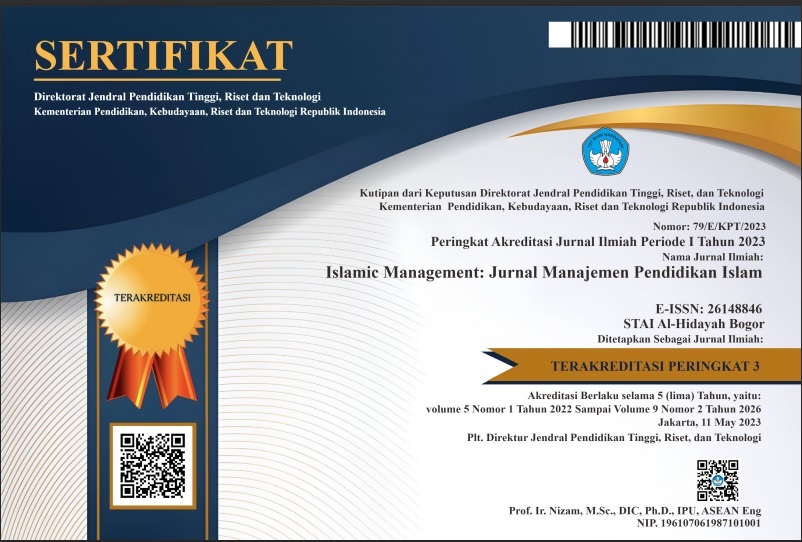MANAJEMEN KEPEMIMPINAN DI PONDOK PESANTREN MINHAJ SHAHABAH TAMANSARI BOGOR
DOI:
https://doi.org/10.30868/im.v6i01.2732Keywords:
Management, Educational Leadership, Success FaktorAbstract
As one of the main factors in education and even as an indicator of its success, educational leadership must be managed properly and optimally. Namely through management processes related to the flow or activities of planning, organizing, implementing or acting, and evaluating. This research is a type of field qualitative research located at Mah’had Minhaj Shahabah Tamansari Bogor in 2022 year, focusing on leadership management that is carried out and becomes the main typology in leadership. Based on this research, it can be concluded that the leadership management typology of Mudir Mah’had Minhaj Shahabah Tamansari Bogor is democratic and situational leadership which is framed by prophetic leadership which is the hallmark of leadership in Islamic boarding schools (ma'had). The leadership management has been running effectively and efficiently, but it must continue to be developed continuously, especially in carrying out the vision, mission, and goals of Ma'had that have been set.
References
Asyafah, A. (2020). Metodologi Penelitian Pendidikan Islam. Bandung: UPI Press. ISBN 978-623-7776-35-2.
Basri, H. (2014). Kepemimpinan Kepala Sekolah. Bandung: Pustaka Setia. ISBN 978-979-076-467-5-
Danim, S. (2012). Kepemimpinan Pendidikan. Bandung: CV ALFABETA. ISBN 978-602-8800-02-0.
Dewi, E.R., et.al. (2020). Konsep Kepemimpinan Profetik. Al-Muaddib: Jurnal Ilmu-Ilmu Sosial dan Keislaman, 5 (1), 147-159. doi: http://dx.doi.org/10.31064/muaddib.v5i1.147-159.
Hifza, et.al. (2020). Kepemimpinan Pendidikan Islam dalam Perspektif Interdisipliner. Nidhomul Haq: Jurnal Manajemen Pendidikan Islam 5 (1), 46-61. doi: http://doi.org/10.315838/ndh.v5i1.518.
Laliasa, G., Nur, M., & Tambunan, R. (2018). Pengaruh Gaya Kepemimpinan Demokratis, Lingkungan Kerja Dan Motivasi Kerja Terhadap Kinerja Pegawai Dinas Perkebunan Dan Hortikultura Provinsi Sulawesi Tenggara. Journal Of Economic and Business 3 (3), 403-404.
Maktumah, L. dan Minhaji. (2020). Prophetic Leadership dan Implementasinya dalam Pendidikan Islam. Jurnal Pendidikan Islam Indonesia 4 (2), 133-147. doi: http://10.35316/jpii.v4i2.196.
Marno dan Supriyatno, T. (2013). Manajemen dan Kepemimpinan Pendidikan Islam. Bandung: PT Refika Aditama. ISBN 979-1073-48-1.
Maya, R. dan Iko, L. (2018). Pemikiran Prof. Dr. Mujamil Qomar, M.Ag. Tentang Manajemen Pendidikan Islam. Jurnal Islamic Management 01 (02), 291-316. DOI: 10.30868/im.vli2.281.
Moleong, L. J. (2021). Metodologi Penelitian Kualitatif. Bandung: PT Remaja Rosdakarya. ISBN 979-514-051-5.
Nasukah, B., Harsoyo, R., dan Winarti, E. (2020). Internalisasi Nilai-nilai Kepemimpinan Profetik di Lembaga Pendidikan Islam. Dirasat: Jurnal Management dan Pendidikan Islam, 6 (1), 52-68. http://journal.unipdu.ac.id/index.php/dirasat/index. ISSN:2550-1038.
Nasution, W.N. (2015). Kepemimpinan Pendidikan di Sekolah. Jurnal Tarbiyah, 22 (1), 66-86. doi: http://10.30829/tar.v22i1.6.
Rahmat, A. dan Kadir, S. (2016). Manajemen Kepemimpinan dan Kemampuan Berkomunikasi Kepala Sekolah Pada Kinerja Pendidik. Jurnal Komunikasi, 8 (1), 1-11. doi: http://dx.doi.org/10.24912/jk.v8i1.58.
Sugiyono. (2020). Metode Penelitian Kualitatif. Bandung: CV Alfabeta. ISBN 978-602-289-325-7.
Zawawi, A.H. dan Sa’diyah, M. (2022). Kepemimpinan pada Manajemen Mutu Terpadu Pendidikan Islam di MTs Al-Ma’tuq Cisaat Sukabumi. Reslaj: Religion Education Social Laa Roiba Journal, 4 (1), 54-64.
Downloads
Published
How to Cite
Issue
Section
Citation Check
License
Authors who publish with this journal agree to the following terms:
- Authors retain copyright and grant the journal right of first publication with the work simultaneously licensed under a Creative Commons Attribution License that allows others to share the work with an acknowledgment of the work's authorship and initial publication in this journal.
- Authors are able to enter into separate, additional contractual arrangements for the non-exclusive distribution of the journal's published version of the work (e.g., post it to an institutional repository or publish it in a book), with an acknowledgment of its initial publication in this journal.
- Authors are permitted and encouraged to post their work online (e.g., in institutional repositories or on their website) prior to and during the submission process, as it can lead to productive exchanges, as well as earlier and greater citation of published work (See The Effect of Open Access).







